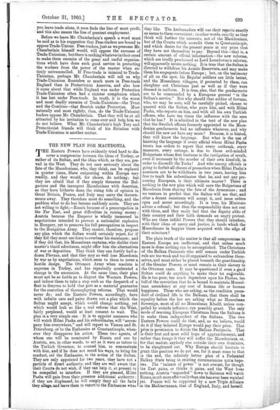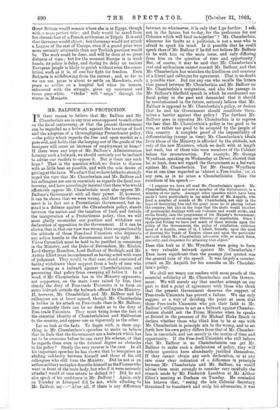THE NEW PLAN FOR MACEDONIA.
THE Eastern Powers have evidently tried hard to dis- cover a compromise between the ideas of Turkey, or rather of its Sultan, and the ideas which, as they see, pre- vail in the West. They do not care seriously about the fate of the Macedonians, who, they think, can be replaced in quieter times, Slays emigrating within Europe very readily, and they would, for choice, do nothing; but they are afraid that if they simply threaten the Bul- garians and the insurgent Macedonians with desertion, as they have hitherto done, the rising tide of opinion in Great Britain, France, and Italy may carry the Govern- ments away. They therefore must do something, and the problem what to do has become suddenly acute. They are not willing to fight,—Russia because of a preoccupation in the Far East, and great difficulties in raising money ; Austria because the Emperor is wholly immersed in negotiations intended to prevent a nationalist explosion in Hungary, yet to preserve his full prerogatives in respect to the Hungarian Army. They cannot, therefore, propose any plan which the Sultan would certainly reject, for if they did they must use force to overbear his resistance ; and if they did that, his Mussulman captains, who dislike their master's timid adroitness, might offer him the alternatives of war or deposition. They think they can fortify half-a- dozen Plevnas, and that they may as well lose Macedonia by war as by negotiations, which seem to them to cover a hostile design. The Ottoman Army when resolute is supreme in Turkey, and has repeatedly accelerated a change in the succession. At the same time, their plan must not be so feeble as to disgust the Western Powers, and induce them to take a step such as the despatch of a fleet to Smyrna to hold that port as a material guarantee for the execution of thoroughgoing reforms. That would never do ; and the Eastern Powers, accordingly, have with infinite care and pains drawn out a plan which the Sultan might accept, which would change nothing, yet which would look so like a real reform that the West, 'fairly perplexed, would at least consent to wait. The plan is a very simple one. It is to appoint assessors who will watch Hilmi Pasha and his subordinates, will "accom- pany him everywhere," and will report to Vienna and St. Petersburg, or to the Embassies at Constantinople, when- ever they disapprove his action. These two agents, of whom one will be nominated by Russia and one by Austria, are, in other words, to act as it were as tutors to the Turkish Governor, to counsel him, to remonstrate with him, and if he does not mend his ways, to bring his conduct, rid the Embassies, to the notice of the Sultan. They are only appointed for two years, they have not a particle of direct authority, and they are well aware that their Courts do not wish, if they can help it, at present to be compelled to interfere. If they are pleased, Mimi Pasha will gain from their presence additional authority ; if they are displeased, he will simply deny all the facts they allege, and leave them to report to the Embassies what they like. The Ambassadors will use their reports exactly as seems to them convenient ; in other words, exactly as they think will further the interests, not of the Macedonians, but of the Courts which accredit them to qonstantinople, and which desire for the present peace at any price that they have not themselves to pay. Beyond this—that is, a certain amount of official information—the new reforms, which are loudly proclaimed as Lord Lansdowne's reforms, will apparently secure nothing. It is true that the Sultan is directed to withdraw his Asiatic Reservists, and may make them his scapegoats before Europe ; but, on the testimony of all on the spot, his Regular soldiers are little better, and the Mussulman villagers, if protected by them, can slaughter out Christians just as well as if they were dressed in uniform. It is true, also, that the gendarmerie are to be commanded by a European general " in ,the Sultan's service." But why should that soldier of fortune, who, we may be sure, will be carefully picked, choose. to quarrel with the Sultan, who pays him, and with Mimi Pasha, who reports on him, and with all his own Turkish officers, who have ten times the influence with the men that he has ? It is admitted in the text of the new plan that the Swedish officers formerly appointed to the Mace- donian gendarmerie had no influence whatever, and why should the new set have any more ? Because, it is hint, they will know the language. But what is the use of knowing the language if every official whom Hilmi Papha trusts has orders to report that every outbreak, evpry massacre, every outrage, is due to those evil-minded Bulgarians whose first business is the instigation of revolt, even if necessary by the murder of their own kinsfolk, in order to discredit the Turks ! And who among officials is going to forfeit all chance of promotion when Hilmi Pasha's assessors are to be withdrawn in two years, leaving him free to teach his subordinates that he, and not any pre- suming European, is their ultimate master? There is nothing in the new plan which will save the Bulgarians of Macedonia from sharing the fate of the Armenians ; and we venture to predict that the Sultan will see that, and after a decent resistance will accept it, and issue orders open and secret accordingly. It is true, his Ministers advise a refusal ; but then the responsibility does not rest with them, and they really feel that the dignity alike of their country and their faith demands an angry protest. Who are these infidel Powers that they should interfere, with their ideas of mercy and justice, in lands which the Mussulmans in happier times acquired with the edge of their scimitars ?
The plain truth of the matter is that all compromises in Eastern Europe are ineffectual, and that unless much more is done nothing can be accomplished. The Christians of the Balkan Peninsula who still remain under Turkish rule are too weak and too ill organised to enfranchise them- selves, and must either be placed beneath the guardianship of the Greater Powers, or must remain in their slavery to the Ottoman caste. It may be questioned if even a good. Sultan could do anything to make their lot endurable. He is too poor, too much dependent upon his Pashas, too full of the conviction that he is bound to maintain Mussul- man ascendency at any cost of human life or human happiness. Those who are asking, as the condition prece- dent of civilised life in the Balkans, that there shall be equality before the law are asking what no Mussulmau Sovereign, most of all no Mussulman Khalif, unless com- pelled by outside influence, can possibly grant. The only mode of rescuing European Christians from the Sultan; is to make them independent of the Sultans. The two Eastern Powers could do that, and, as we believe, would do it if they believed Europe would pay their price. That price is permission to divide the Balkan Peninsula. That is their first and most solid hope of aggrandisement, and rather than forego it they will suffer the Macedonians, or, for that matter, anybody else outside their own dominion, to be slaughtered out. Why Europe should hesitate to grant this position we do not see, for it must come to that in the end, the infinitely better plan of a Federated Balkan State being in existing circumstances quite hope- less. The " balance of power ' is not overset, for though the East gains, or thinks itgains, and the West loses nothing, Austria " expanded " down to Salonica will watch Russia much more effectually than she has ever been watched yet. France will be supported by a new Triple Alliance in the Mediterranean. that of England, Italy, and herself. Great Britain would remain where she is in Egypt, though with a more perfect title ; and Italy would be saved from her chronic fear of a French settlement in Tripoli. It is said that Germany would object ; but Germany would not attack a League of the rest of Europe, even if a grand prize were more certainly attainable than any Turkish province would be. The work could. be done, and will be done at no great distance of time ; but for the moment Europe is in weak hands, its policy is delay, and during its delay an ancient European people is likely to perish without even the conso- lation, such as it is, of one fair fight for freedom. Even. Bulgaria is withdrawing from the contest ; and, so far as we can see, peace is about to settle on Macedonia, such peace as settles on a hospital bed when its inmate, exhausted with the struggle, gives up resistance and turns grev-white. " Order " will " reign" through the winter in 'lldonastir.



















































 Previous page
Previous page